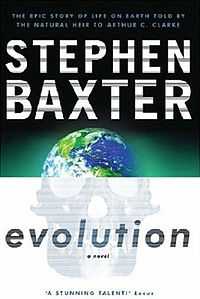Evolution (novel)
| Evolution | |
|---|---|
 First edition cover | |
| Author | Stephen Baxter |
| Country | United Kingdom |
| Language | English |
| Genre | Science fiction novel |
| Publisher | Orion Publishing Group |
Publication date | November 30, 2002 |
| Media type | Print (Paperback & Hardback) |
| Pages | 592 pp (DelRey Hardcover ed.) |
| ISBN |
ISBN 0-575-07342-X (first edition, paperback) & ISBN 0-575-07341-1 (hardback edition) |
| OCLC | 50527130 |
Evolution is a collection of short stories that work together to form an episodic science fiction novel by author Stephen Baxter. It follows 565 million years of human evolution, from shrewlike mammals 65 million years in the past to the ultimate fate of humanity (and its descendants, both biological and non-biological) 500 million years in the future.
Plot summary
The book follows the evolution of mankind as it shapes surviving Purgatorius into tree dwellers, remoulds a group that drifts from Africa to a (then much closer) New World on a raft formed out of debris, and confronting others with a terrible dead end as ice clamps down on Antarctica.
The stream of DNA runs on elsewhere, where ape-like creatures in North Africa are forced out of their diminishing forests to come across grasslands where their distant descendants will later run joyously. At one point, hominids become sapient, and go on to develop technology, including an evolving universal constructor machine that goes to Mars and multiplies, and in an act of global ecophagy consumes Mars by converting the planet into a mass of machinery that leaves the Solar system in search of new planets to assimilate. Human extinction (or the extinction of human culture) also occurs in the book, as well as the end of planet Earth and the rebirth of life on another planet. (The extinction-level event that causes the human extinction is, indirectly, an eruption of the Rabaul caldera, coupled with various actions of humans themselves, some of which are only vaguely referred to, but implied to be a form of genetic engineering which removed the ability to reproduce with non-engineered humans.) Also to be found in Evolution are ponderous Romans, sapient dinosaurs, the last of the wild Neanderthals, a primate who witnesses the extinction of the dinosaurs, symbiotic primate-tree relationships, mole people, and primates who live on a Mars-like Earth. In the book's epilogue, it is implied that the replicator machines sent by humans to Mars have developed sentience and high technology, unknowingly advancing the late mankind's legacy in the Universe.
Reception
Peter Cannon reviewing for Publishers Weekly stated "here is a rigorously constructed hard SF novel where the question is not whether humanity will reach the stars but how it will survive its own worst tendencies."[1] Kirkus Reviews called this novel "glum, dyspeptic, and depressing."[2] Jackie Cassada said in her review for Library Journal that "spanning more than 165 million years and encompassing the entire planet, Baxter's ambitious saga provides both an exercise in painless paleontology and superb storytelling."[3]
Evolution has been compared to Olaf Stapledon's Last and First Men and Baxter has acknowledged Stapledon's influence.[4]
References
- ↑ Cannon, Peter (January 20, 2003). "EVOLUTION (Book)". Publishers Weekly 250 (3): 61. ISSN 0000-0019.
- ↑ "EVOLUTION (Book)". Kirkus Reviews 70 (22,): 1662. November 15, 2002. ISSN 0042-6598.
- ↑ Cassada, Jackie (February 15, 2003). "Evolution (Book)". Library Journal 128 (3): 172.
- ↑ "An Interview with Stephen Baxter". Aberrant Dreams. Retrieved 31 July 2013.
External links
- Lengthy review at http://www.indymedia.ie/article/74240
| |||||||||||||||||||||||||||||||||||||||||